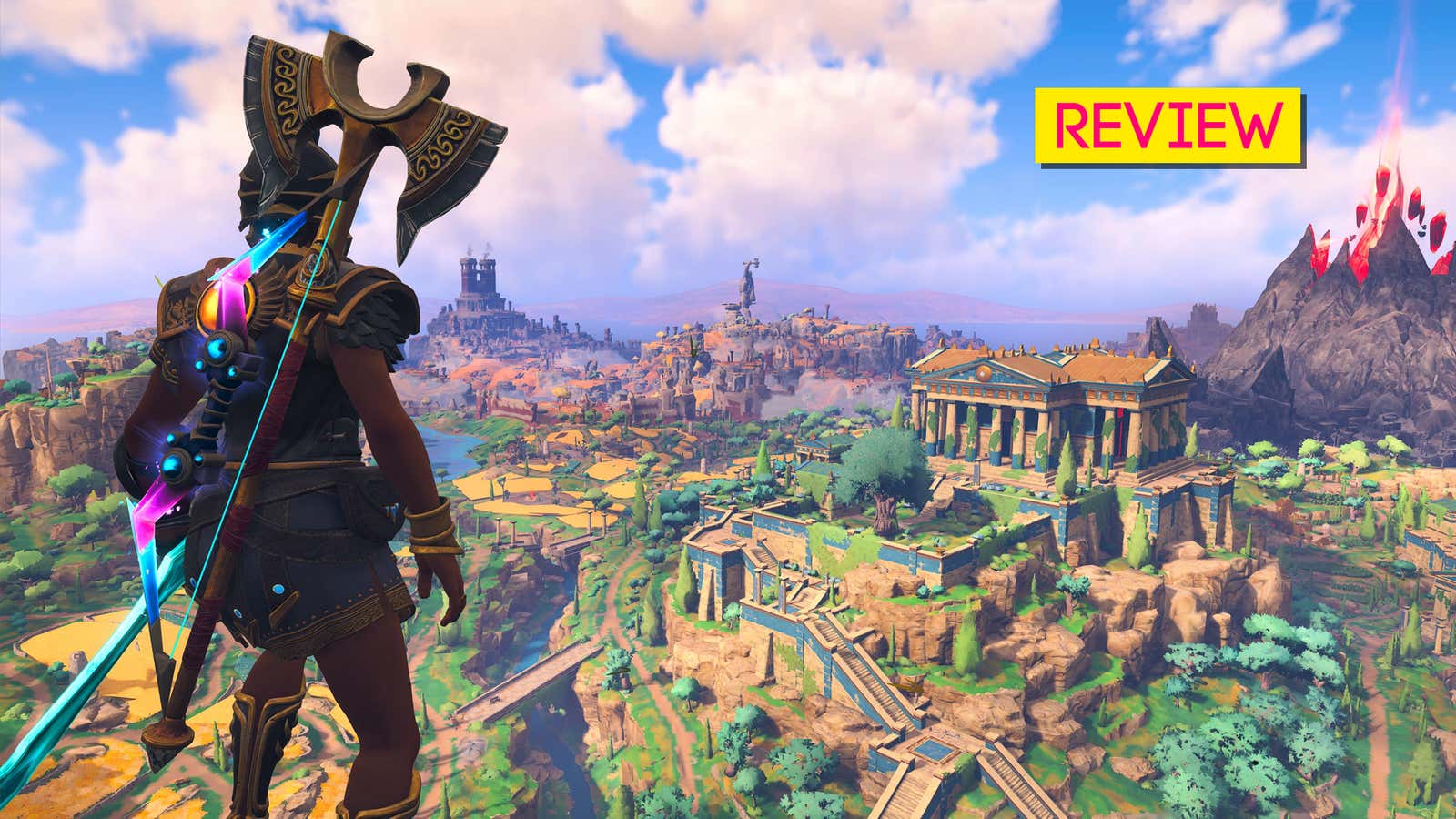Immortals: Fenyx Rising isn’t the game I was expecting. I was prepared for a big Ubisoft open-world action game filled with colorful vistas, Greek gods, and some elements inspired by The Legend of Zelda: Breath of The Wild. It is all of that, but it’s not just Assassin’s Creed: Hyrule. It’s a welcome streamlining of large-scale Ubisoft game design, full of great puzzles and amusing storytelling.
(Note: This review was originally published on December 1. We’re bumping it up for the game’s release day.)
First revealed in 2019 as Gods & Monsters, Immortals: Fenyx Rising was developed primarily by Ubisoft Quebec, the same Ubisoft team who led the creation of 2018’s Assassin’s Creed Odyssey. Not surprisingly, Immortals and Odyssey share a lot in common. They both involve Greek mythology, and feature large open worlds dotted with collectibles and things to do. Also like Odyssey, Immortals is a third-person game featuring combat that utilizes the controller’s triggers and gives players the ability to sneak around enemies to deliver stealthy attacks.
I played through Immortals’ story, toyed with some side stuff and wrapped up in under 30 very enjoyable hours. This shorter playtime than many Ubisoft games is the result of a smaller map alongside systems that minimize the time players spend in menus and maximize the time they’re adventuring out in the spectacular world. Immortals feels more focused than the average Ubisoft mega-game, and more charming too.
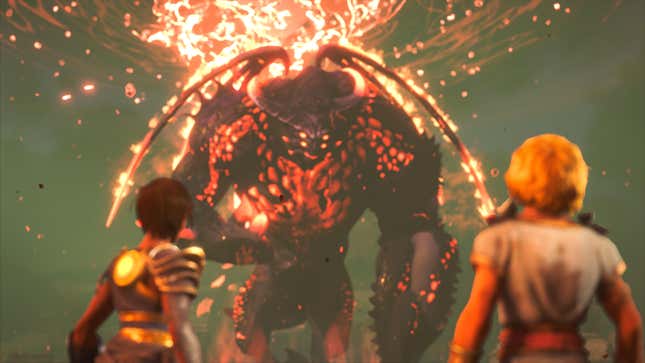
You play as Fenyx, a somewhat talented warrior who has long been overshadowed by her brother, a greater warrior and hero. The game begins with Fenyx and other soldiers on a ship somewhere off the coast of ancient Greece, when a massive storm destroys all the ships in your fleet. You awake on a strange island filled with mythical beasts and magical items, and the world in grave danger. An ancient evil threat, Typhon, has returned to destroy the gods and rebuild the world as he desires. As a result, nearly all humans have been turned into stone, including your brother! You meet up with Hermes, the messenger god, who explains that Typhon defeated the other gods and has trapped them in various states of helplessness. For example, the goddess Aphrodite is stuck in a tree without all her powers or personality. They need you, a potential hero, to help them return to their former glory in time to stop Typhon.
The story of your adventures is narrated by two major figures from Greek myth, the god Zeus and the titan Prometheus, whom Zeus famously chained to a mountain as punishment for sharing fire with mortals. Because of Typhon’s attacks, Zeus is desperate for help and seeks Prometheus’ aid. Prometheus isn’t a big fan of Zeus, but suggests that mortals could be the key to saving the world. To do this he tells the tale of… Immortals: Fenyx Rising. This means you’ve got Zeus and Prometheus narrating and discussing various things while you play—a lot during the intro, but then more sparingly, fading into the background, only speaking when necessary. When they chime in, it’s often for comedic purposes. This happens during an early quest in the game where players are tasked with recreating the mythical birth of Aphrodite. Zeus takes over narrating this bit, and explains that her birth involved a pearl being thrown into the ocean. As you continue the quest, getting a pearl and rolling it downhill to the water, Prometheus finally interrupts Zeus’s story. He explains that Zeus is wrong and has been lied to. The actual birth of Aphrodite, according to myth, was a lot more violent and involved genitals being ripped off. Prometheus whispers this info to Zeus, letting the game stay somewhat family-friendly. Zeus is shocked and grossed out, calling Prometheus sick. Prometheus, meanwhile, finds it all rather amusing and enjoys another opportunity to get back at the powerful Zeus.
The writing and acting here are great, as Zeus and Prometheus peck at each other in humorous ways. As with all the other characters in Immortals, they are written more like modern people than classical gods. They use slang, make jokes about the internet, and will often criticize the various Greek myths for being too mean, gross or weird. On paper this might sound terrible. In practice, it works incredibly well. And as the game goes on, their storyline and Fenyx’s start to converge, with Zeus going through a satisfying character arc.
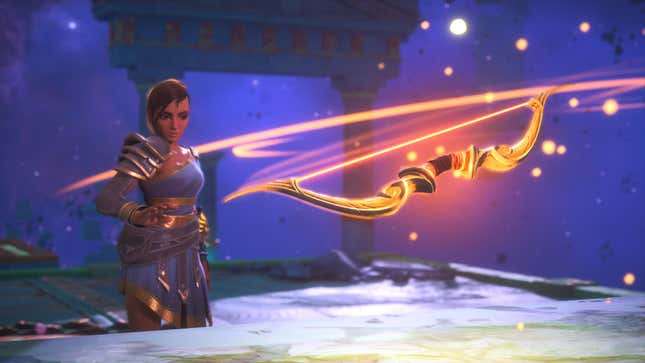
Speaking of Fenyx, I adore her. (You can also play Fenyx as a male character if you want, but for this review, I’ll be referring to Fenyx as a woman.) She’s written not as a champion or powerful warrior, but instead as a fangirl with a heart of gold, who just wants to help. I couldn’t help but root for Fenyx. She freaks out over meeting the gods or seeing mythical creatures—it’s cute, and I found myself excited about how excited she was. She makes the fun and over-the-top world of Immortals that much more enjoyable to explore and dig into, if only to see her reaction to it all. And because Immortals ditches the dialogue options seen in Odyssey, her character feels more fully realized. This is just another example of how much more focused is this open-world Ubisoft game.
The story is good, and the game is beautiful. Immortals features a colorful world that looks as though it’s been ripped from a painting. Bright blue skies, vibrant green fields and neon white buildings pop off the screen. It’s one of the best-looking games of the year. I caught myself stopping frequently just to admire a forest or some cool-looking cliffs.
The best thing the game has you do amid all this sight-seeing is solving puzzles. There are a lot of them scattered around the world. Some are just sitting behind a cliff or in the middle of a forest, waiting to be solved. Others are hidden away in Vaults of Tartaros, like the puzzle shrines found in Breath of The Wild. And like those of the Zelda game, the puzzles in these chambers are often the more elaborate and difficult. They will force the player to use multiple elements at once, like balancing a block on a moving platform while shooting switches with your bow to turn off the force fields that could stop the block from moving forward. Outside of these vaults, the puzzles can be less complicated and often involve finding clues in the environment, like torches lit on a wall matching where you should place orbs on a strange floor.
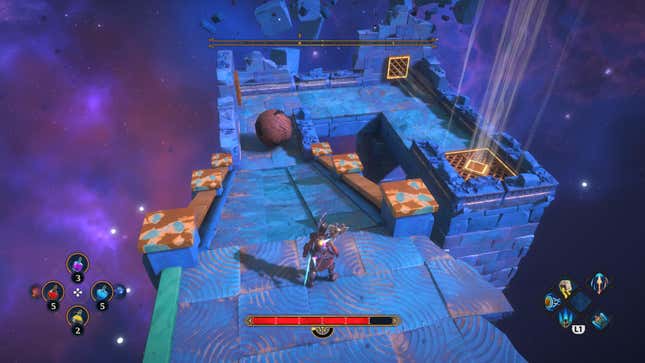
It shouldn’t be a shocker that Immortals, which is heavily inspired by Breath of The Wild, features a lot of puzzles. But I wasn’t expecting this many. Nearly every side activity in the world is tied into, connected to, opens up to, or is locked behind a puzzle. Thankfully, the vast majority of these are wonderful and satisfying to solve.
Most of the puzzles in Immortals fall right into that sweet spot where you start to feel a little dumb or frustrated and then… BAM! You see the hidden button or notice a wall that can be knocked down, you start to unlock the solution in your head, and feel like the smartest person in the world.
At first, the puzzles are rather simple, asking you to move a block on top of a pressure plate or roll a metal sphere into a specific spot to unlock a door. As you get deeper into the game, things get tougher. Eventually, you’ll dodge lasers, change the direction of the wind, use physics to break through barriers, and guide arrows around mazes. Helping you complete a lot of these puzzles are your magical wristbands, which grant you the ability to pick up and carry large objects, including boulders and metal boxes. Some challenges can be annoying, but this is a game that lets you upgrade your character to a point where you can cheese some solutions if you don’t mind cheating a bit. At one point the game presented a bunch of obstacles that I would need to avoid while pushing a heavy block around them, activating different switches to remove obstacles that could destroy the block. Instead, because I had unlocked the ability to just pick up super heavy objects, I grabbed the block, chucked it out of the puzzle area and pushed it on the pressure plate to open a nearby door. Puzzles are easy when you can skip them! I love games that give you this option to creatively solve things, even if it means breaking the game a bit or using some wonky physics to do so.
But Immortals isn’t just solving puzzles and listening to gods joke about things. There is a good amount of combat, too. In this regard, the results are mixed and the streamlining goes too far.
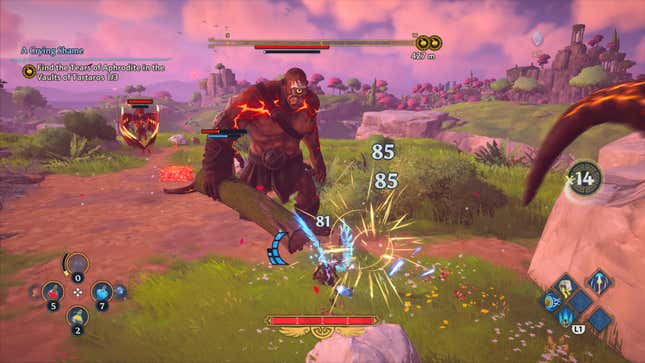
First the good. There is no annoying loot grind in Immortals. As with Assassin’s Creed Odyssey, you can deck your hero out with collectible gear, letting you find new swords or helmets and the like. But in this game these items only show up in specified chests or as rewards in quests, not as drops when you kill enemies. This means you aren’t collecting a pile of 40 crappy swords and sorting through them after each big quest. Immortals further simplifies weapons and gear by giving them perks but no distinct stats. You might find a sword that does more damage when you have full health, or one that helps you earn more resources. But both of these weapons do the same amount of damage. You can upgrade the stats for all items of the same type back at The Hall of Gods, a centralized location that you unlock early on that serves as your base of operations. As you complete puzzles, open chests, defeat monsters, and finish quests, you earn various resources. These are used to upgrade overall stats that cover how much damage your armor can take, how much damage your bows can deliver, and how powerful your swords can be. It means you can grab any sword from your inventory and start using it, and it will be as effective and deadly as the sword you were using before, just with different perks or bonuses. I really liked this approach, as it meant everything I did helped to improve all my gear and equipment. I ended up spending far less time screwing around in menus and inventories to equip, upgrade, or dismantle gear, and more time killing bad guys and solving puzzles.
Unfortunately, the game’s combat abilities are too streamlined. There are just five—including a shield bash ability and a large hammer attack—that are unlocked within the first few hours of the game and that’s that. You can upgrade them, but if you dislike one of these abilities, too bad. You are stuck with them for the whole game. The smaller tool box makes progression feel less meaningful. For example, it felt extremely odd and disappointing to use the same abilities to take down both the first boss in the game and, 25 hours later, the last. I enjoyed all five abilities and found them useful in most situations, but still, a little more variety would have gone a long way.
Moment to moment, Immortals is a lot of fun, and the design mostly works when it comes to exploring the world, but I was occasionally disappointed with some missed opportunities. The game’s main quests don’t feel as creative as Immortals’ overall world and story. Most of the quests involve you solving a few simple puzzles, killing some enemies and then returning to the quest giver for the next step. It’s not that any of these quests are bad or even boring, it’s just that I wanted more memorable narrative drive. For example, I found one god stuck in the body of a chicken. He was angry about it and needed my help, both because he was a chicken and also because he had lost his courage and confidence. It’s an absurd situation. Yet the quests you complete for him mostly involve killing a bunch of enemies and helping the chicken-god take back his castle by solving some puzzles. You don’t get to fight with the chicken or become a chicken or hunt down other chickens or anything weird or funny like that. What a waste of a perfectly silly setup for strange quests or objectives.
Thankfully, the main quests still include the great comedic narration as the rest of the game, which helped me push through when I found myself losing interest. And there are some great optional hidden quests that you find throughout the game, which helped make up for the lack of more interesting main-story requirements.
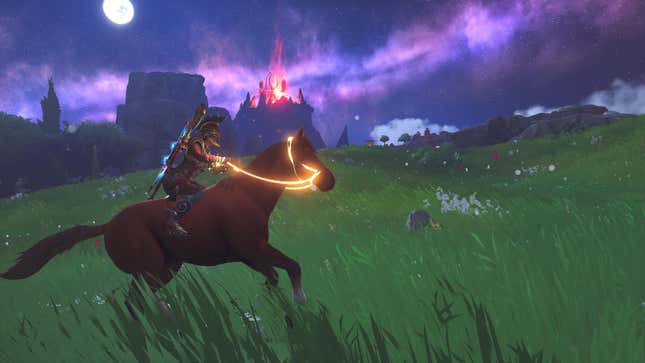
All this said, I can’t ignore the Lynel in the room. I’ve alluded to it a bit already, but yes, this game is very similar to Breath of The Wild. The cartoonish graphics evoke that Breath of The Wild feel, and you have to manage a stamina bar while you climb and swim. Those similarities are easy to see. However, as you play, you’ll find more meaningful connections. Like how you help save gods who, in return, give you blessings when you do so, which reminded me a lot of Breath of The Wild’s Champions and their abilities. In fact, one of the gods in Immortals gives you a blessing that restores your health when it is depleted, letting you fight some more. It has a 22 minute cooldown between uses however. This is nearly identical to Mipha’s Grace, a champion ability in Breath of The Wild. The only difference is that game has a 24 minute cooldown between uses.
So is this a bad thing? I don’t think so. Game developers aren’t robots. They are humans who live in our world and play games made by other companies and devs. It’s not shocking that some developers played one of the most critically acclaimed open-world games released in the last decade and took inspiration when working on their own open-world game. And more personally, I didn’t like how empty and annoying Breath of The Wild was, with it’s constantly breaking swords, empty world and terrible performance. So Immortals takes the parts I like about Breath of The Wild—the visuals, simplified combat, puzzles and exploration—and replaces the annoying bits and adds some great comedy. And it all runs at a near locked 60fps on PS5, a nice advantage over the sub-30 fps action of Breath of The Wild on Switch.
Immortals impressed me. It’s an unexpected success, blending comedy and condensed open-world gameplay into one of the most entertaining games I’ve played this year. Even if the combat lacks some variety and the main quests are a bit stale, the rest of Immortals is fantastic. It takes the modern open-world game and compresses it into something easier to enjoy, covering the whole thing in colorful art, great humor, and a ton of puzzles. If, over the years, you’ve found yourself getting bored of big open-world games that strive to look hyper-realistic and feature 200 hours of quests, Immortals might just be the perfect alternative.
